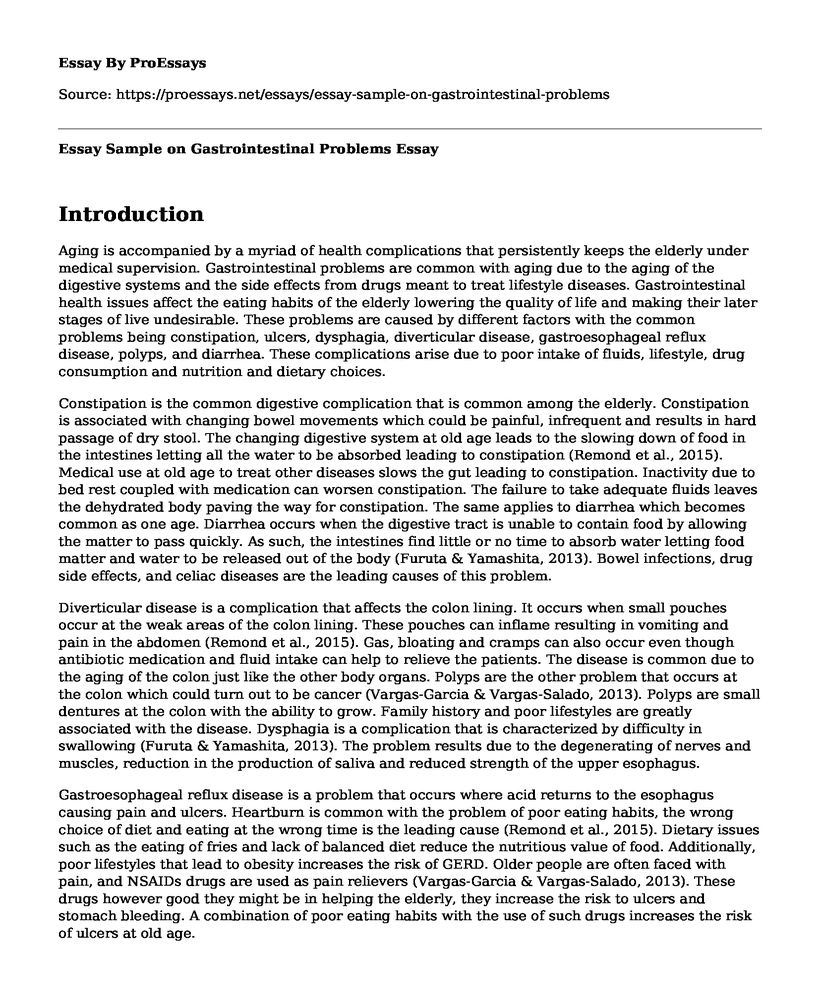Introduction
Aging is accompanied by a myriad of health complications that persistently keeps the elderly under medical supervision. Gastrointestinal problems are common with aging due to the aging of the digestive systems and the side effects from drugs meant to treat lifestyle diseases. Gastrointestinal health issues affect the eating habits of the elderly lowering the quality of life and making their later stages of live undesirable. These problems are caused by different factors with the common problems being constipation, ulcers, dysphagia, diverticular disease, gastroesophageal reflux disease, polyps, and diarrhea. These complications arise due to poor intake of fluids, lifestyle, drug consumption and nutrition and dietary choices.
Constipation is the common digestive complication that is common among the elderly. Constipation is associated with changing bowel movements which could be painful, infrequent and results in hard passage of dry stool. The changing digestive system at old age leads to the slowing down of food in the intestines letting all the water to be absorbed leading to constipation (Remond et al., 2015). Medical use at old age to treat other diseases slows the gut leading to constipation. Inactivity due to bed rest coupled with medication can worsen constipation. The failure to take adequate fluids leaves the dehydrated body paving the way for constipation. The same applies to diarrhea which becomes common as one age. Diarrhea occurs when the digestive tract is unable to contain food by allowing the matter to pass quickly. As such, the intestines find little or no time to absorb water letting food matter and water to be released out of the body (Furuta & Yamashita, 2013). Bowel infections, drug side effects, and celiac diseases are the leading causes of this problem.
Diverticular disease is a complication that affects the colon lining. It occurs when small pouches occur at the weak areas of the colon lining. These pouches can inflame resulting in vomiting and pain in the abdomen (Remond et al., 2015). Gas, bloating and cramps can also occur even though antibiotic medication and fluid intake can help to relieve the patients. The disease is common due to the aging of the colon just like the other body organs. Polyps are the other problem that occurs at the colon which could turn out to be cancer (Vargas-Garcia & Vargas-Salado, 2013). Polyps are small dentures at the colon with the ability to grow. Family history and poor lifestyles are greatly associated with the disease. Dysphagia is a complication that is characterized by difficulty in swallowing (Furuta & Yamashita, 2013). The problem results due to the degenerating of nerves and muscles, reduction in the production of saliva and reduced strength of the upper esophagus.
Gastroesophageal reflux disease is a problem that occurs where acid returns to the esophagus causing pain and ulcers. Heartburn is common with the problem of poor eating habits, the wrong choice of diet and eating at the wrong time is the leading cause (Remond et al., 2015). Dietary issues such as the eating of fries and lack of balanced diet reduce the nutritious value of food. Additionally, poor lifestyles that lead to obesity increases the risk of GERD. Older people are often faced with pain, and NSAIDs drugs are used as pain relievers (Vargas-Garcia & Vargas-Salado, 2013). These drugs however good they might be in helping the elderly, they increase the risk to ulcers and stomach bleeding. A combination of poor eating habits with the use of such drugs increases the risk of ulcers at old age.
Conclusion
Digestive problems among the elderly results from reduced activity and lack of exercise, poor diets, and continuous use of drugs that influence metabolism. Even if some conditions are unavoidable, it is necessary for the elderly to eat the right diet, avoid the use of drugs if possible and engage in body exercise. These factors can help to eliminate some problems which reduce the quality of life during aging.
References
Furuta, M., & Yamashita, Y. (2013). Oral health and swallowing problems. Current physical medicine and rehabilitation reports, 1(4), 216-222.
Remond, D., Shahar, D. R., Gille, D., Pinto, P., Kachal, J., Peyron, M. A., ... & Tomas-Cobos, L. (2015). Understanding the gastrointestinal tract of the elderly to develop dietary solutions that prevent malnutrition. Oncotarget, 6(16), 13858.
Vargas-Garcia, E. J., & Vargas-Salado, E. (2013). Food intake, nutritional status and physical activity between elderly with and without chronic constipation. A comparative study. Cirugia y cirujanos, 81(3), 214-220.
Cite this page
Essay Sample on Gastrointestinal Problems. (2022, Jul 25). Retrieved from https://proessays.net/essays/essay-sample-on-gastrointestinal-problems
If you are the original author of this essay and no longer wish to have it published on the ProEssays website, please click below to request its removal:
- "Nursing Preceptors Speak Out: An Empirical Study" - Article Analysis Essay
- Nursing Staffing and Scheduling Essay Example
- Stay Hydrated: Essay Sample on The Benefits of Drinking Water for Your Health
- Tackling Overweight & Obese Kids: Involve Parents to Fight the Challenge - Essay Sample
- Essay Example on Maintain Ideal BMI for Health: 3 Strategies
- Essay Example on Overweight Predisposes Individuals to Cardiovascular Diseases: BMI Vital for Interventions
- Essay Sample on Information Dilemmas in Nursing







